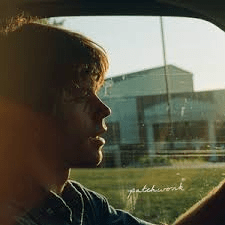If you’ve heard of him, then you were probably introduced to Jesse Welles online. He has become something of a protest folk hero on TikTok and Instagram reels, where his song “War Isn’t Murder”—a stunning and bitterly sarcastic anti-war song—went viral last spring amid demonstrations across the globe protesting the war in Gaza. Shortly after that, he released his debut album, Hells Welles, which was followed by Patchwork late last month.
It should be said that Welles hasn’t actually come out of absolutely nowhere, but has been performing and releasing music under various names and with various bands for more than a decade. Most of these projects were grungier and more rock-oriented, like his 2018 album with the band Welles, Red Trees and White Trashes. Yet I don’t feel that he’s just trying one thing after another in a desperate attempt to break through to some kind of success. The music he’s been releasing this last year, as Jesse Welles, seems to be just another incarnation of who he is as an artist.
On Patchwork, he’s now playing back-to-the-basics, deceptively simple acoustic folk songs which leave space for subtle musical skill and especially for his famously piercing lyricism. Armed with a guitar, a harmonica, age-old chord progressions, folk melodies, and a husky, sweetly sandpapery voice, Welles is taking on the great American songwriting tradition, occupying the role of the perceptive, fearlessly honest, tell-it-like-it-is observer.
Hells Welles, released last July, was full of witty, if sometimes obnoxiously cynical commentaries on current social issues. Patchwork’s lead single “Walmart” is like that, a clever birds-eye-view of American life. But for the most part, this is a collection of songs that not only feels tighter and more polished, but also more personal and vulnerable.
On “That Can’t Be Right,” he reflects on the passage of time through a specific yet relatable reference to his father’s dislike of photographs. “See Arkansaw” provides a chilling moment of signature straightforwardness as he takes a trip through his home state. He tells listeners of poverty, drug crisis, nuclear power, and the Christianity that is barely holding it all together: “I saw a law man shrug his whole body/resign to an American god/said if they wanted to, they would help themselves/and he put away his bible and he got out a gun.” His ability to speak with such clarity and avoid sounding preachy or moralizing is one of his best qualities, and if you open the comment section below one of his videos, you’ll see more “this generation’s [insert name of socially-conscious songwriting legend here]” compliments than you can stand. Personally, when I hear his work on this album, especially his more heartfelt lyrics, I hear the influence of John Prine, a capable musician who stood out for his keen understanding of the complicated world around him and his ability to communicate exactly what it felt like to live in it. And, like Prine, Welles’ genuineness is what makes him so compelling.
There certainly are moments on this record that feel hackneyed, with “My Little Town” for instance being hard to feel anything other than ambivalent about. And yet there are so many moments of plain honesty or human empathy that make it hard not to feel that you’re listening to the voice of someone who has things to say. Moments when you feel that this is someone who exists on the edge of something terrifying, like we all seem to do these days, but also right at the heart of what American music was, is, and will be; even in a world where it’s hard to know what exactly that sounds like. Patchwork is a collection of songs worth listening to, and seeing as how evolving seems to be one of the things that Jesse Welles does best, I can’t wait to see what comes next for him.












Leave a comment